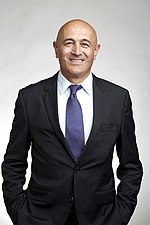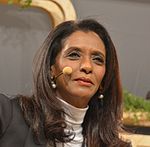British Arabs
| Total population | |
|---|---|
| Regions with significant populations | |
| London, Birmingham, Manchester, Leeds, Sheffield, Glasgow, Cardiff, Newcastle upon Tyne, Leicester, Nottingham, York | |
| Languages | |
| Arabic (160,000 native speakers in England and Wales[citation needed]) · British English | |
| Religion | |
| Islam (Sunni, Shia; also Sufi); Christianity (Orthodox, Catholic, Melkite, Protestantism, Anglican, etc.) | |
| Related ethnic groups | |
| 'Other Ethnic Group' (UK Census), Arabs |
British Arabs (Arabic: عرب بريطانيا) are citizens or residents of the United Kingdom that are of Arab ethnic, cultural and linguistic heritage or identity from different Arab countries. Arabs also come non-Arab countries as ethnic minorities.
Overview[]
"British Arabs" is used as an official ethnic designation by the National Association of British Arabs.[1] It is also employed by academics,[2] and in the media.[3]
Unlike Black British or Asian British, the term "British Arab" was not one of those employed in government ethnicity categorisations used in the 2001 UK Census and for national statistics.[4] As a result, community members are believed to have been under-counted in previous population estimates according to the National Association of British Arabs (NABA). This absence of a separate "Arab" category in the UK census obliged many to select other ethnicity categories.[5] In the late 2000s, the British government announced that an "Arab" ethnicity category would be added to the 2011 UK Census for the first time.[6] The decision came following lobbying by the National Association of British Arabs and other Arab organizations, who argued for the inclusion of a separate "Arab" entry to accommodate under-reported groups from the Arab world.[7]
Including both write-in and tick-box responses, 230,556 Arabs were recorded in the 2011 Census in England, 9,989 in Wales,[8] and 9,366 in Scotland.[9] In NABA's own report on the 2011 Census, it adds up answers from the write-in responses that it classifies as Arab, namely "Arab", "African Arab", "White and Arab", "Moroccan", "North African", "Other Middle East", "Somali", "Somalilander" or "White and North African", arguing that this gives a total of 366,769 Arabs in England and Wales but noting that there may be double-counting of individuals in this total, since it is uncertain how many of these individual write-in responses are also included in the general "Arab" category.[10]
Most British Arabs live in the Greater London area, and many are either businesspeople, recent immigrants or students.[5] There are also sizable and long-established Yemeni Arab communities living in both Cardiff and the South Shields area near Newcastle-upon-Tyne.
A diverse community, British Arabs are represented in the business and media fields, among other areas. Miladi's 2006 survey of 146 community members during the summer of 2001 reported Al-Jazeera as being the respondents' preferred news outlet. Reasons supplied for the selection included the quality of the station's programs and transmission, its discussion of current issues in the Arab world, and the possibility of giving voice to the community's concerns and positions on various matters.[11]
Additionally, 2010 was a breakthrough year in terms of political participation. Several British Arabs ran for and/or were appointed to office as community representatives.[12][13]
Religion[]
According to the 2011 Census, the religious breakdown of Arabs in England and Wales, and Scotland can be seen in the table below.[14][15]
Percentages of Arab population
| Religion | England and Wales[14] | Scotland[15] |
|---|---|---|
| 77.27% | 80.13% | |
| 9.54% | 6.61% | |
| 0.46% | 0.09% | |
| 0.25% | 0.05% | |
| 0.22% | 0.13% | |
| 0.17% | 0.15% | |
| Not Stated | 6.54% | 4.84% |
| No religion | 5.18% | 7.67% |
| Other religions | 0.37% | 0.34% |
| Total | 100% | |
Notable British Arabs[]
- Jim Al-Khalili (OBE), (British Iraqi) Professor of Theoretical Physics, author, broadcaster and presenter of science programmes on BBC radio and television. [16]

- Dame Zaha Hadid (DBE, RA), (British-Iraqi) renowned architect who received the UK's most prestigious architectural award, the Stirling Prize, in 2010 and 2011 and the first woman to receive the Pritzker Architecture Prize (in 2004).[17]
- Lowkey, (British-Iraqi), musician
- Kefah Mokbel, (British-Syrian), breast surgeon and founder of the UK charity Breast Cancer Hope.
- Mustafa Suleyman, (British-Syrian), entrepreneur and co-founder of DeepMind which Google bought for an estimated £400 million in 2014.
- Alexander Siddig, (British-Sudanese),actor known for his role in Syriana and Kingdom of Heaven.
- Zeinab Badawi, (British-Sudanese), journalist at BBC world (previously ITV and Channel 4 News).
 Zeinab Badawi at Nobel Week Dialogue in Stockholm 2016.
Zeinab Badawi at Nobel Week Dialogue in Stockholm 2016. - Shadia Mansour, (British-Palestinian), musician
- Nadia Sawalha, (British-Jordanian), television presenter, cook and actress known for her role as Annie Palmer in EastEnders.
- Kamal El-Hajji, (BEM), (British-Moroccan), Serjeant-at-Arms of the House of Commons (in 2015).
- Moe Sbihi, (MBE), (British-Moroccan), rower and twice Olympic medal winner.
- Naseem Hamed, (British-Yemeni), professional boxer who held multiple featherweight world championships.
- Mo Farah, (British-Somali), professional long distance runner for the British olympic team.
- Elyes Gabel, (British-Algerian), actor known for his role in Seasons 1 and 2 of the Game of Thrones.
- Tarik O'Regan, (British-Algerian), composer and recipient of two British Composer Awards.
- Mika (singer), (British-Lebanese), singer and songwriter.
- Amal Clooney (née Alamuddin), (British-Lebanese) barrister specialising in international law and human rights and special envoy on media freedom by the British Foreign and Commonwealth Office.
- Peter Medawar - (British-Lebanese Father), 1960 Nobel Prize winner in Medicine.
- Layla Michelle Moran, (British-Palestinian), member of Parliament, Liberal Democrat MP for Oxford West and Abingdon.
- Eugene Cotran, (British-Palestinian), Circuit judge in England.
- Jade Thirlwall, (half-Egyptian/Yemeni), musician, part of Little Mix.
- Amir El-Masry, (British-Egyptian), actor known for The Night Manager and Tom Clancy's Jack Ryan
- Sir Magdi Yacoub OM FRS: (British-Egyptian) Cardiothoracic surgeon celebrated as the surgeon that carried out UK's first heart and lung transplant in the 1980s.

See also[]
- Arab diaspora
- Arabs in Europe
- British Arab Commercial Bank
- List of British Muslims
- Algerians in the United Kingdom
- Egyptians in the United Kingdom
- Emiratis in the United Kingdom
- British Iraqis
- Lebanese people in the United Kingdom
- Sudanese in the United Kingdom
- Yemenis in the United Kingdom
- Somalis in the United Kingdom
References[]
- ^ "The National Association of British Arabs". The National Association of British Arabs. Archived from the original on 9 February 2008. Retrieved 7 June 2009.
- ^ Nagel, Caroline (2001). "Hidden minorities and the politics of 'race': The case of British Arab activists in London". Journal of Ethnic and Migration Studies. 27 (3): 381–400. doi:10.1080/136918301200266130.
- ^ Akbar, Arifa (10 January 2004). "Kilroy was here... BBC suspends daytime host". The Independent. London. Archived from the original on June 16, 2009. Retrieved 7 June 2009.
- ^ "Population size: 7.9% from a minority ethnic group". Office for National Statistics. 13 February 2003. Archived from the original on 27 May 2009. Retrieved 7 June 2009.
- ^ Jump up to: a b Jalili, I.K. "Study for consideration of inclusion of 'Arab' as an ethnic group on ethnicity profile forms" (PDF). National Association of British Arabs. Archived from the original (PDF) on 2 April 2015. Retrieved 30 November 2012.
- ^ "2011 Census Questions Published". BBC News. 21 October 2009. Retrieved 27 April 2010.
- ^ "Arab Population in the UK - Study for consideration of inclusion of 'Arab' as an ethnic group on future census returns". Archived from the original on 9 January 2013. Retrieved 30 December 2012.
- ^ "Table CT0010EW 2011 Census: Ethnic group (write-in responses), local authorities in England and Wales". Office for National Statistics. 30 January 2013. Retrieved 8 March 2020.
- ^ "Ethnic group (detailed): All people" (PDF). National Records of Scotland. Retrieved 8 March 2020.
- ^ "REPORT ON THE 2011 CENSUS – MAY 2013 – Arabs and Arab League Population in the UK". National Association of British Arabs. Archived from the original on May 29, 2014. Retrieved 25 April 2014.
- ^ Miladi, Noureddine (August 2006). "Satellite TV News and the Arab Diaspora in Britain: Comparing Al-Jazeera, the BBC and CNN". Journal of Ethnic and Migration Studies. 32 (6): 947–960. doi:10.1080/13691830600761552.
- ^ Tarbush, Susannah (26 April 2010). "Arab engagement in the British general and local elections". Al-Hayat. Retrieved 30 November 2012.
- ^ Tarbush, Susannah (17 June 2010). "Mixed results in the British general and local elections for candidates of Middle Eastern origin". Al-Hayat. Retrieved 30 November 2012.
- ^ Jump up to: a b "DC2201EW - Ethnic group and religion" (Spreadsheet). ONS. 15 September 2015. Retrieved 14 January 2016. Size: 21Kb.
- ^ Jump up to: a b "Table DC2201SC - Ethnic group by religion". Scotland's Census 2011 (Spreadsheet). National Records of Scotland.
- ^ Professor Jim Al-Khalili OBE [1], Profile, University of Surrey.
- ^ Nonie Niesewand (March 2015). "Through the Glass Ceiling". Architectural Digest. Retrieved 22 December 2018.
External links[]
- National Association of British Arabs
- Arab British Centre
- British Arabs Resource Centre Broken link
- Arab British Chamber of Commerce (ABCC)
- BBC Arab London
- Reassessing what we collect website – Arab London History of Arab London with objects and images - Broken link
- Arabs in the United Kingdom
- British people of Arab descent
- Muslim communities in Europe

